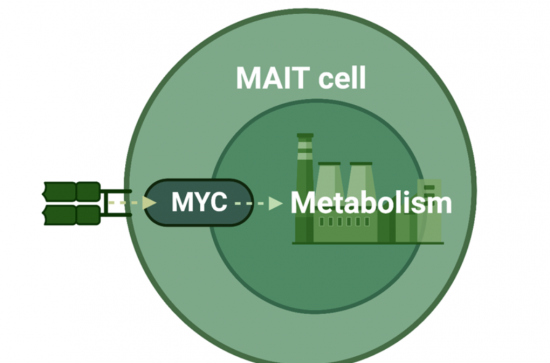
Wednesday, April 19, 2023 - 09:30
Maynooth University study finds the metabolic regulator MYC is defective in obesity
Research led by Maynooth University and published today in the US journal, Science Signaling, has found that the protein MYC is essential for MAIT cell growth, proliferation, metabolism and function. The latest findings are of critical importance to the study of MAIT cells and the development of metabolic disease such as obesity.

A team of researchers led by Dr Andrew Hogan, of the Kathleen Lonsdale Institute for Human Health Research, investigated MAIT cells for a master metabolic regulator and found that MYC is essential for MAIT cells to take in nutrients, which are critical for them to function. It also found MYC is defective in people with obesity.
The team has previously outlined in several papers how MAIT cells (which are a subset of immune cells) are defective in obesity. Last year, the team published findings showing that defective MAIT cells could directly drive insulin resistance by disrupting insulin signalling in children with obesity.
On the importance of today’s published findings, Dr Andrew Hogan said: “In previous papers, we have outlined how the engine of the MAIT cell was defective but we didn’t know why. In today’s paper, we investigated MAIT cells for a master metabolic regulator and found a protein called MYC is essential for MAIT cell growth, proliferation, metabolism and function.
“We found that MYC helps MAIT cells take in nutrients, which allows them to function. Finally, we found that MYC is defective in people with obesity, providing a mechanism to explain why MAIT cells are defective in obesity. Our research shows that MAIT cells are heavily implicated in the development of metabolic disease. Therefore it is of critical importance that we understand how they work and what goes wrong in obesity.”
Dr Hogan explained that having identified a major MAIT cell regulator (MYC), and shown that dysfunction in this protein underpins the defects in MAIT cells, the researchers are now investigating if they can target MYC to restore MAIT cell functions and if this is protective in obesity.
The paper ‘MYC controls MAIT cell proliferation’ published in Science Signaling is co-authored by Dr Andrew Hogan, Kathleen Lonsdale Research Institute of Human Health Research, Maynooth University and Dr Linda V. Sinclair, University of Dundee.
The research team comprises Kathleen Lonsdale Institute for Human Health Research, Maynooth University; National Children’s Research Centre, Dublin; Division of Cell Signalling and Immunology, School of Life Sciences, University of Dundee; Department of Biological Sciences, Munster Technological University, Cork; St Vincent’s University Hospital and University College Dublin; School of Biosciences, University of Birmingham and the Institute of Life Science, Swansea University Medical School.
Read the full journal article here.
